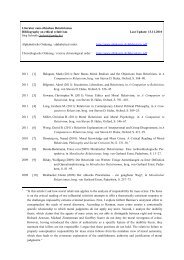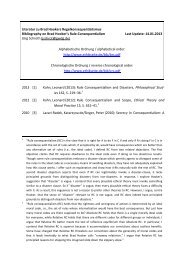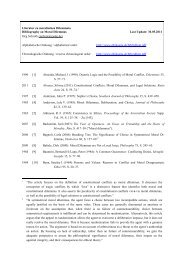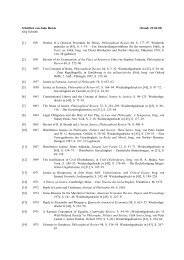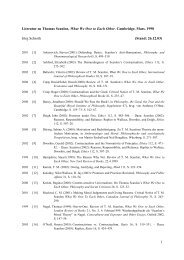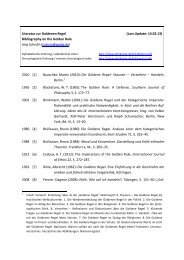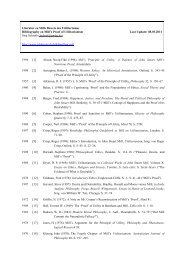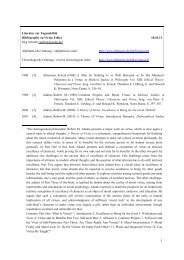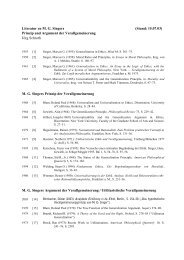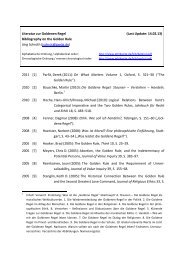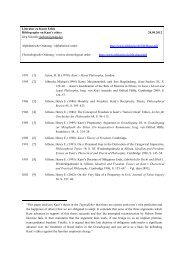Chronologische - Ethikseite
Chronologische - Ethikseite
Chronologische - Ethikseite
You also want an ePaper? Increase the reach of your titles
YUMPU automatically turns print PDFs into web optimized ePapers that Google loves.
2000 [677] Rawls, John (2000): Lectures on the History of Moral Philosophy, hrsg. von Barbara Herman,<br />
Cambridge, Mass, S. 143–325. – Geschichte der Moralphilosophie. Hume – Leibniz –<br />
Kant – Hegel, hrsg. von Barbara Herman, Frankfurt a. M. 2002, S. 199–421.<br />
2000 [678] Rescher, Nicholas (2000): On the Reach of Pure Reason in Kant’s Practical Philosophy, in<br />
ders., Kant and the Reach of Pure Reason. Studies in Kant’s Theory of Rational<br />
Systematization, Cambridge, S. 188–99.<br />
2000 [679] Rescher, Nicholas (2000): On the Rationale of Kant’s Categorical Imperative, in ders., Kant<br />
and the Reach of Pure Reason. Studies in Kant’s Theory of Rational Systematization,<br />
Cambridge, S. 200–29.<br />
2000 [680] Rescher, Nicholas (2000): On the Unity of Kant’s Categorical Imperative, in ders., Kant and<br />
the Reach of Pure Reason. Studies in Kant’s Theory of Rational Systematization,<br />
Cambridge, S. 230–47.<br />
2000 [681] Schaller, Walter E. (2000): Kant on Right and Moral Rights, Southern Journal of Philosophy<br />
38, S. 321–42.<br />
2000 [682] Senn, Marcel (2000): Ethik und Recht bei Kant und Spinoza, in Zur Aktualität der Ethik<br />
Spinozas. hrsg. von Klaus Hammacher, Irmela Reimers-Tovote und Manfred Walther,<br />
Würzburg S. 279–316.<br />
2000 [683] Simon, Josef (2000): Moral bei Kant und Nietzsche, Nietzsche-Studien 29, S. 178–198.<br />
2000 [684] Stratton-Lake, Philip (2000): Kant, Duty and Moral Worth, London. 139<br />
2000 [685] Taylor, Richard (2000): Good and Evil, Amherst, S. 139–56 (“Kantian Morality”).<br />
2000 [686] Timmermann, Jens (2000): Kant’s Puzzling Ethics of Maxims, Harvard Review of Philosophy<br />
8, S. 39–52.<br />
2000 [687] Timmermann, Jens (2000): Kant und die Lüge aus Pflicht. Zur Auflösung moralischer<br />
Dilemmata in einer kantischen Ethik, Philosophisches Jahrbuch 107, S. 267–283.<br />
2000 [688] Weiper, Susanne (2000): Triebfeder und höchstes Gut. Untersuchungen zum Problem der sittlichen<br />
Motivation bei Kant, Schopenhauer und Scheler, Würzburg.<br />
2000 [689] Wood, Allen W. (2000): Kant’s Practical Philosophy, in The Cambridge Companion to<br />
German Idealism, hrsg. von Karl Ameriks, S. 57–75.<br />
1999 [690] Berkowitz, Peter (1999): Virtue and the Making of Modern Liberalism, Princeton, S. 106–33<br />
(“Kant: Virtue within the Limits of Reason Alone”).<br />
1999 [691] Cunningham, Anthony (1999): Kantian Ethics and Intimate Attachments, American<br />
Philosophical Quarterly 36, S. 279–94.<br />
139 “An examination of Kant’s account of moral worth. The debate over whether or not Kant said moral actions<br />
have worth only if they are carried out from duty or whether actions carried out from mixed motives can be<br />
good is complex and lies at the heart of Kant’s philosophy. Philip Stratton-Lake offers an account of acting<br />
from duty which utilizes the distinction between primary and secondary motives. He maintains that the<br />
moral law should not be understood as normative moral reason but as playing a transcendental role. Thus, a<br />
Kantian account of moral worth is one where the virtuous agent is one who is responsive to concrete<br />
particular considerations whilst preserving an essential role for universal moral principles.”



